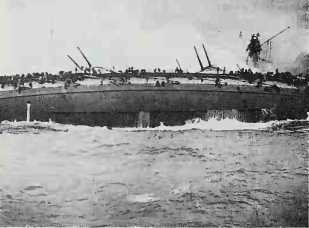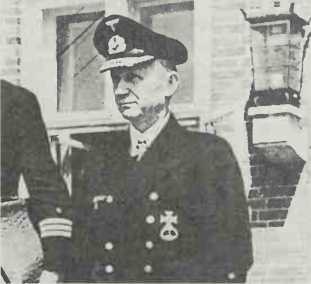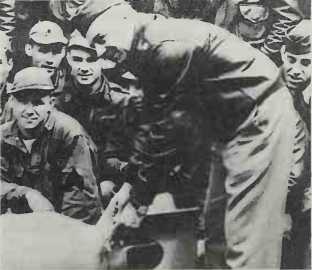Dive bombing see bombing.
Division. Army formation comprising all arms, made up of not less than two brigades, commanded by a major general. Also (British Army) an administrative grouping of infantry regiments, e. g. The King’s Division.
Diyala river see mesofotamian
CAMPAIGN (1914-18).
Dneiper, Battle of the (1943). The second longest river in the Soviet Union, the Dneiper formed a natural defence line for the German Army as it struggled to stem the Red Army’s drive westwards during 1943. However, the extreme length of the front and the relative weakness of its forces made the German position far from impregnable. On October 10 the Third Ukrainian Front attacked the German bridgehead on the east bank of the river around Zaporozhye. While the German High Command debated an evacuation, two Soviet Corps decided the issue by driving the First Panzer Army back across the Dneiper. Matters were little better for von Kleist’s Army Group A to the south where the Fourth Ukrainian Front pushed the German Sixth Army back across the Nogay Steppe to the lower reaches of the Dneiper, isolating the Seventeenth Army in the Crimea. The Soviet pressure was also maintained in the north where, on October 15, Koniev’s Second Ukrainian Front launched an attack across the river, striking for Krivoi Rog. A counterattack checked the Soviet advance at the end of the month, but a further assault was now unleashed further north against Kiev. On November 3, Vatutin’s First Ukrainian Front broke out of its bridgeheads above the city, shattering the Fourth Panzer Army’s front and forced a German evacuation. Although von Mainstein juggled the resources of Army Group South to mount several counterattacks, by the end of the year the defence line on the Dneiper had been destroyed. MS.
Dobbie, Lt Gen Sir William
(1879-1964). Br. Governor and c-in-G, Malta at the outbreak of war with Italy. A devout and gallant Christian gentleman, he inspired the garrison and people of Malta throughout the worst period of the siege and heaviest bombing from January 1941 to May 1942, when, having reached the point of exhaustion, he was relieved by Field Marshal Lord Gort.
Dobell, Lt Gen Sir Charles (18691954). Br. Commanded the Allied forces in the Cameroons, 1914-16. He served in the Egyptian-based campaign of 1916-17 against Turkey and greatly distinguished himself in the attack on Gaza launched on March 26 1917, which he planned and in which he commanded the Palestine Force.
Do Cao Tri, Lt Gen (1929-71). Republic of Vietnam. Widely regarded as the most energetic fighting general of the Army of the Republic of Vietnam (arvn). Trained in France in 1947-49, Tri became arvn I Corps commander in 1962; II Corps commander in 1964. Premier Nguyen Cao Ky exiled him to Hong Kong in 1965 for suspected involvement in the Buddhist turbulence. Three years later President Nguyen Van Thieu, short of competent commanders, put him in charge of II Corps. A fearless swashbuckler, Tri swooped down in his helicopter to take over personal command of lagging units, and in spring 1970 he was the arvn commander of the Cambodia “incursion” by American and Vietnamese forces. He died on February 23 1971 in a helicopter crash. WST.

Cruiser Bliicher sinks at Dogger Bank
Dogger Bank (January 24, 1915), North Sea. On January 24 1915 a German force of three battlecruisers and a large armoured cruiser, supported by light cruisers and destroyers, under the command of Vice Adm von Hipper, steamed to the Dogger Bank in the hope of destroying any British light forces that might be found. The Admiralty, forewarned by decoded radio intercepts, deployed five battlecruisers under Vice Adm Beatty, supported by light cruisers and destroyers, to intercept the Germans.
The opposing forces encountered one another on the morning of January 24. Hipper, recognizing that he was outnumbered and outgunned, fled with the British in hot pursuit. The complete destruction of the German battlecruisers seemed a near certainty, but when Beatty’s flagship was disabled, a confusion in flag communication and poor judgment by Beatty’s second-in-command resulted in the concentration of the other British battlecruisers against the German armoured cruiser, which had been badly damaged and had fallen away from the main line; this unit was sunk, but the interruption of the chase allowed Hipper’s battlecruisers to escape from their pursuers. JTS.
Dogger Bank incident (1904). Passing through the North Sea on its long voyage to defeat at Tsushima, the Russian Baltic Fleet under Rozhdestvenski unexpectedly encountered some 40 Hull fishing trawlers off the Dogger Bank on the foggy night of October 21 1904. Believing that Japanese torpedo boats from secret bases in Scandinavia were attacking them, some Russian ships opened fire, sinking one trawler and killing or wounding eight fishermen. War with Britain seemed possible until, in December 1904, Russia apologized and promised full compensation for the error.
Doiran see Salonika campaign.
Donets, Battle of the (1943). By February 1943 the Soviet winter offensive had punched a gap 100 miles (160km) wide in the German line along the River Donets and Kharkov was hastily abandoned. The situation was so grave that Hitler felt it necessary to pay a personal visit to Army Group South’s headquarters at Zaporozhye. Consequently von Man-stein’s forces were reshuffled and reinforced and a major counteroffensive, supported by von Richthofen’s Fourth Air Force, was approved. On February 20 Hoth’s Fourth Panzer Army pushed out of Dnepropetrovsk and von Macken-sen’s First Panzer Army closed around the most advanced Soviet formation, Popov’s “Mobile Group”. By the 24th the exposed Soviet units had been badly mauled and forced to withdraw towards the Donets. Encouraged by this success, von Manstein switched the focus of his attack northwards to Kharkov and the Soviet Voronezh Front. With the thaw threatening to inhibit their operations, the Germans accelerated their advance and, by March 5, First Panzer Army was installed along the Donets. The next objective was the recapture of Kharkov. Ignoring Hoth’s orders for a gradual approach, on the 11th, Lt Gen Hausser sent two divisions of his SS Panzer Corps into the city. Three days later Kharkov fell but the offensive was maintained and Hausser’s men took Belgorod on March 18. Von Manstein considered continuing the advance but Hoth persuaded him that his troops were exhausted and would need the river line of the Donets as a defence against the next Soviet onslaught. MS.
Dong Khe, Battle of see border
WAR, VIETNAM.
Donitz, Grand Adm Karl (18911980). Ger. Commander of U-boats and later of the German Navy during World War 11. In 1914 he was Lt on Breslau accompanying Goeben in her escape to Turkey. In 1918 he commanded the submarine U-68 in the Mediterranean and was taken prisoner when she was sunk.
Between the wars, Donitz helped to develop the “anti-submarine school”, clandestinely training submarine crews. Soon after the existence of U-boat arm was officially admitted (1935), Donitz became its commander. He shaped it in accord with his ideas on “wolf-pack” attacks controlled from shore headquarters, using the cover of darkness to enable U-boats to act as surface torpedo boats. These tactics would provide superb initial results, but would eventually prove vulnerable to allied countermeasures. Central control required much use of radio

Donitz: German naval chief, 1943-45
By the submarines, which became a fatal weakness in the face of Allied direction-finding and decrypting.
He entered World War II with only 57 operational submarines - far too few for the purpose of sustained attack on British trade. He believed in a protracted struggle, placing a considerable proportion of his resources on training. At first only a few U-boats could be maintained on patrol in the Atlantic. The position was greatly improved by the capture of bases in Norway and France in 1940, and the “happy time” followed, with the available U-boats achieving high scores. A seesaw struggle followed, and in early 1943 it seemed that the convoy system was crumbling under wolf-pack attacks — but by the summer the U-boats were defeated.
Donitz was now head of the Navy, replacing Raeder in January 1943. He managed to persuade Hitler to rescind his order to get rid of the surface fleet. His main hopes were pinned on the new types of submarine which in the event appeared too late. Donitz was a fervent Nazi and Hitler bequeathed the headship of the state to him. He was sentenced to 10 years’ imprisonment at Nuremberg. CJWICD.
Donovan, Maj Gen William J (“Wild Bill”) (1883-1959). US. A much-decorated World War 1 veteran and a leading lawyer, Donovan was in 1941 appointed head of the Office of Coordinator of Information, renamed the Office of Strategic Services (oss) in 1942. A wily and efficient organizer, Donovan was a most effective chief of America’s premier clandestine warfare organization.
Doodlebug. British slang for German V-1.
Doolittle, Lt Gen James H
(b. l896). US. Between the two world wars, Doolittle was a pioneer of instrument flying techniques and a top racing pilot, winning the Schneider Trophy in 1925 and setting a world speed record in 1932. Recalled to active duty from the Air Corps Reserve in 1940, he planned the first American air attack against the Japanese homeland during World War II. Doolittle personally led the 16 B-25s which took off from uss Hornet on April 18 1942 to bomb targets in Tokyo, Kobe, Nagoya, Yokohama and Yokosuka. He received the Congressional Medal of Honor for this mission and, in September 1942, was given command of the US Twelfth Air Force, which supported the Allied campaign in North Africa. Early in 1943 Doolittle was, in addition, made head of the Northwest African Strategic Air Forces. Then, after the Allied invasions of Sicily and Italy, he took over the newly activated Fifteenth Air Force in the Mediterranean on November 1 1943. On January 6 1944, Doolittle became commander of the US Eighth Air Force, remaining with it until the

Doolittle aboard oss Hornet, April 1942
End of World War II. Eighth Air Force, operating from England until May 1945, made an increasingly weighty contribution to the combined bombing offensive against Germany. Among the policies he encouraged was that of allowing American long-range fighters to seek out and engage enemy aircraft wherever they might be found, a decision which played a significant part in the defeat of the Luftwaffe. PJS.




 World History
World History









